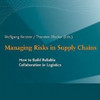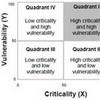 It is always nice to find blogs on supply chain risk written by a professional with extensive knowledge of the field he is covering. Kevin Cornish‘s @risk blog is such a blog. Judging by the list of tags in his sidebar there is very little that escapes his watchful eye, with topics touching upon anything ranging from employee absentism, food safety, to the more obvious: risk mitigation and supplier risk. There is such a wealth of information I am not sure where to begin.
It is always nice to find blogs on supply chain risk written by a professional with extensive knowledge of the field he is covering. Kevin Cornish‘s @risk blog is such a blog. Judging by the list of tags in his sidebar there is very little that escapes his watchful eye, with topics touching upon anything ranging from employee absentism, food safety, to the more obvious: risk mitigation and supplier risk. There is such a wealth of information I am not sure where to begin.
Update 2015/09/10: This blog is no longer working, and all links to the blog have been removed from this post.
Kevin Cornish
Let’s begin with the starting point: Kevin Cornish. Kevin certainly knows what he’s talking about. He has spent the last 20+ years in and around supply chains as an engineer, software architect, supply chain manager, and most recently in senior/strategic management roles for companies like Monster Cable, Bechtel, DigitalThink, and currently Aravo. Judging from his blog entry dates, there’s hardly a day where Kevin doesn’t have anything to say.
The first impression
The posts on Kevin’s blog are usually concise and to the point and reflect Kevin’s thoughts on newly published studies, reports, latest news and current issues in the business world. I have no idea how he finds the time to keep abreast with everything. I for one have more than enough my my little niche: literature reviews, and even there I tend to miss out on one good article after the other. Kevin seems to be everywhere, “flying high and low” as we would say in my country.
The highlights
Let’s look at some of Kevin’s post that made an impression with me.
Kevin’s latest post reports on the Cortera Supply Chain Index, which indicates that inventories appear to have been turned into cash much quicker than usually during the Holiday season, perhaps showing reduced levels of stock at retailers and a fear of overstocking. Unrelated maybe, but this brings to mind a recent post on Betty Feng’s blog, where a deliberate out-of-stock ploy is used to prolong demand for a unique product.
In Report Reveals Labor Violations at Walmart Suppliers in China, Kevin cites a report from China Labor Watch which states that Walmart suppliers in China aren’t meeting the company’s most basic ethical workforce standards. Walmart should care, says Kevin, because
By improving standards in their supply chains and engaging policymakers and other key stakeholders, corporations can help create safe, rights-based conditions for workers –conditions that, ultimately, are mutually beneficial to both workers and the businesses that hire them.
Reputation risk, I believe, will become more and more important in the future, as pressure groups get vocal and find their way to Twitter, Facebook and other social media outlets.
In McDonalds Closing restaurants in Iceland, Kevin underlines how important currency fluctuations are when you are importing supplies, because apparently, McDonald’s franchise holders
are obligated to import all of the goods needed for its restaurants from suppliers under contract with McDonald’s Inc. In this case, that means meats, cheeses, produce — even packaging — for the “Golden Arches” in Reykjavik had to come from Germany. But once the krona collapsed and import tariffs began to skyrocket, this sourcing scheme proved disastrous.
Something to think about before considering global sourcing.
Speaking about global, I did enjoy Kevin’s post comparing global supply chains and boiling frogs:
in many ways, the risks and vulnerabilities of globalized supply chains crept up on corporations like hot water on a boiled frog. (You know, the metaphorical frog that happily sits on the stove in a pot of water, not recognizing the danger it’s in as the temperature of the water slowly increases.)
You don’t realize it’s too late (to do anything about what happened in your global supply chain), until it is too late, much like it is said the the Global Risks 2008 report that lists hyperoptimization of supply chains as one of four potential major threats.
Finishing off my presentation of selected posts, and in tune with current world events in Copenhagen, is Kevin’s post on Adapting to Climate Change. Most businesses, so Kevin says, citing a post on the PFSK blog, aren’t planning for the risks associated with climate change.
Climate adaptation is in part planning for the risk impact of a changing ecosystem services – increased storms, rising sea levels, scarcity of water or other natural resources, increased or decreased temperature extremes, disappearing snow etc. – and (should be) in part looking at the opportunity to evolve, innovate and create value in a climate change context.
Adaptation to climate change as a competitive advantage? Would it be cynical to exploit this business segment for what its worth or would it be just good business sense? I would vote for the latter.
Conclusion
Considering that the blog has been active for just about 6 months, Kevin has already racked up an impressive number of posts. There’s not much that he is not able to somehow link to supplier risk. That said, we ought to keep in mind that everything comes from some supplier somewhere, so everything is somehow at risk. Kevin’s @risk blog is definitely going on my bookmarks.
The blog
- atrisk.net: Supplier Risk for Business Leaders
The author
- linkedin.com: Kevin Cornish
Related
- husdal.com: Supply Chain (Risk) blogs of note
(If you would like to have your blog/website reviewed, please contact me)











